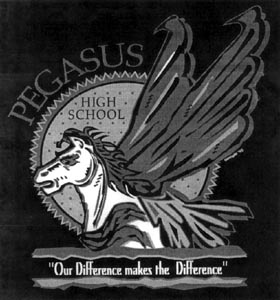 Pegasus High School masters the art of free rein
Pegasus High School masters the art of free reinBy J. Douglas Allen-Taylor
Here is the point in the visit to San Jose's Pegasus High School when it looks like the whole discipline thing is going to come apart like a pair of $12 store-brand jeans. A husky male student has started throwing a rubber ball against the wall in Don Gordon's classroom, bomp, bomp, bomp, and the teacher isn't doing anything about it.
Sandy Thush, Pegasus' principal, describes Gordon as having the "best antenna" around, the kind of guy who stays on top of things better than all the other teachers. Right now the only thing Gordon appears on top of is his desk, sitting with his legs dangling over the front as he collects assignment papers and answers questions from one of the students about the Nova program on the Great Barrier Reef, to the annoying background beat of this small synthetic ball. Gordon is fairly husky himself, a pugnacious Bostonian with the build of a good San Jose State halfback. But he seems oblivious to the ball, which is bouncing against the wall in the back of the room and coming dangerously close to another student's head.
And then, just like that, it's over. The papers are all collected, and Gordon is heading back to his seat and without raising his voice, without even looking toward the back of the room, he says, "OK, it's time to put the ball away." Without a word of protest, the husky student sits back down. The ball goes back in his pocket. Gordon goes on with the next part of the lesson, with all eyes to the front, and everybody seems excited and participating and paying attention.
It is amazing, considering the school's circumstances.
Pegasus is a 120-student alternative school set up in a reconstructed shop building on Independence High School's enormous 4,400-student campus. It takes the term "diversity" to new heights. Up to 50 percent of Pegasus students are parents or have been pregnant; 30 percent have police records; up to 50 percent have gang-affiliation histories; up to 30 percent did not even graduate from middle school. Many have suffered physical or sexual abuse at home or have a history of drug or alcohol abuse; some have been hospitalized in mental health facilities; some have attempted suicide.
The students here are predictably street-smart. During a morning break, one teenager instructs his friends on the best way to cash in food stamps, much like a math teacher would explain a word problem. "You go in the store and you buy a pack of gum with a dollar food stamp," he explains, "and you've got 65 cents change. And then you come right back in and buy another pack of gum with another food stamp, and you got some more change. You do that three or four times, you can go back and get yourself a 40. My father taught me that."
Troubled youth, yes. Yet in two days of observing activities at the 7-year-old school, only one discipline problem is sighted. A male student has been given detention, and he stands in the hallway, quietly protesting. "I ain't coming," he says. "... tell you, I ain't coming." Principal Thush shrugs and walks away. "He won't come," she says. "But then for two or three days after that, he'll show up at detention time on his own, without anybody telling him. He just can't stand being told what to do."
When asked how all of that is possible, the principal gives the credit to the faculty and the students alike.
The only one Thush refuses to give credit to is herself. "Well, we believe in hugging students here," she says. "No matter how tough things get in my office, when it's all over, I ask them if they need a hug. Boys, too."
But there is a good deal more at work than simply New Age cheeriness. This is a school program that has been well thought-out. Pegasus eliminates much of a high school's normal discipline problems by agreeing to ignore the ignorable. Talking in class seems to be frowned on only when it is actually disruptive. Laughter and sometimes shouting erupts from classrooms at odd times, with teachers often ringing in with the loudest voices. Teachers and students appear to share an easy familiarity, more like members of the same family or church than the traditional teacher-student relationship. The school has also reinstituted the old rural school atmosphere that has long since disappeared elsewhere in the valley. For graduation, teachers, administrators, students and members of the students' families all go out to lunch together.
An almost ridiculously low teacher-pupil ratio also helps. Six teachers divide the school program in two 3 1/2-hour sessions. The normal class is 20 students. One journalism class had fewer than 10. It is a school with breathing space.
Some students see their time at Pegasus as epic. "I had to tell my parents that I wasn't going to graduate," David Godinez writes in the latest issue of the school newspaper. "It was hard because they wanted me to graduate like my two sisters before me. I overcame that and decided to enroll in Pegasus to try and graduate.... I am kind of like King Arthur. I started out confused. But after I decided to join Pegasus, it was kind of like drawing the sword from the stone. I felt different and felt the power of learning burning inside me."
[ Metro | Metroactive Central | Archives ]
![[Metroactive Features]](/features/gifs/feat468.gif)